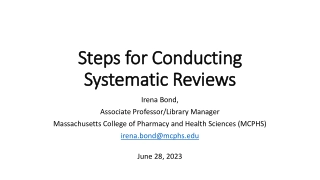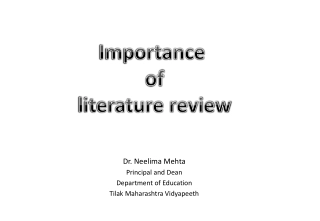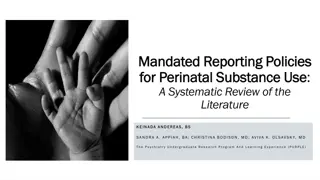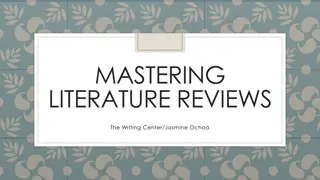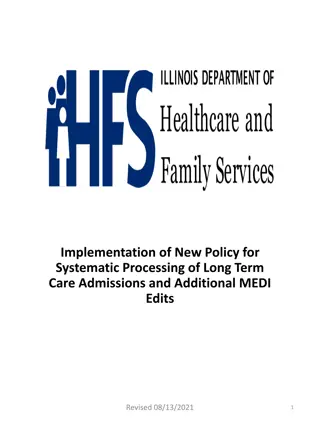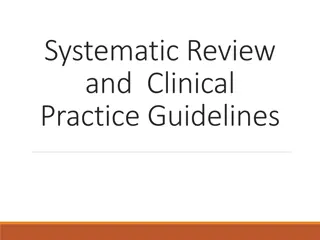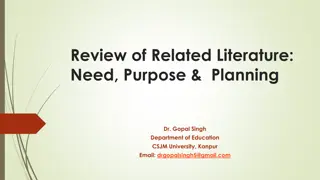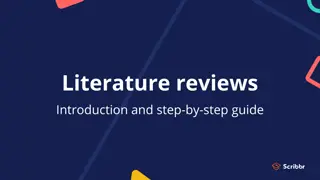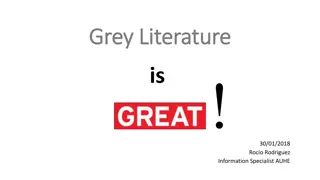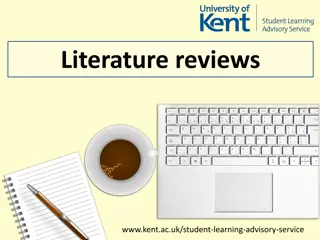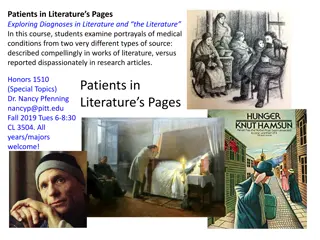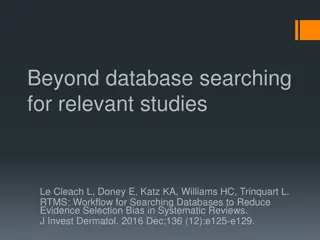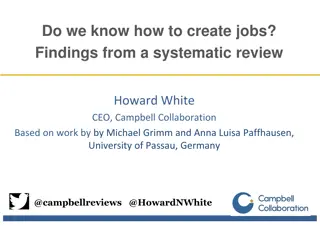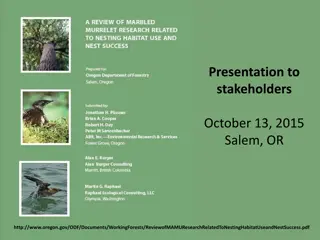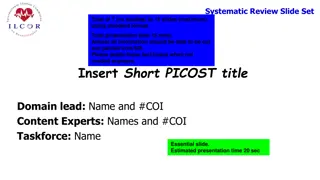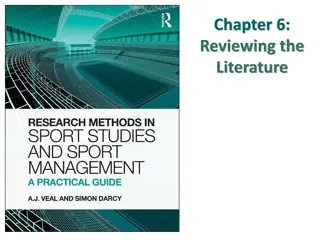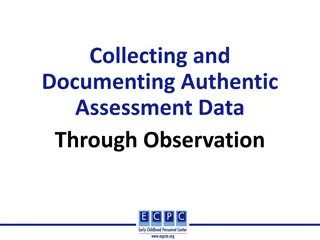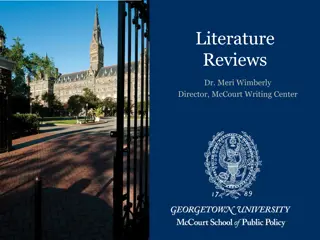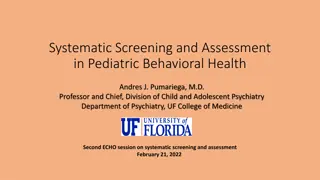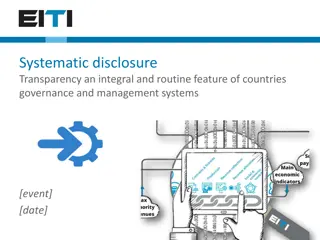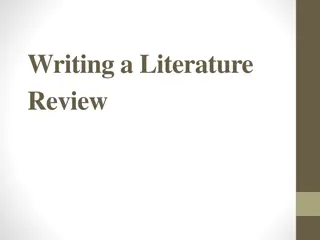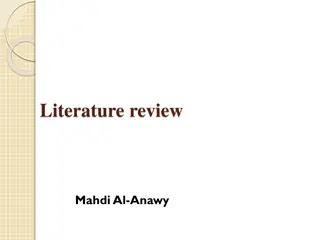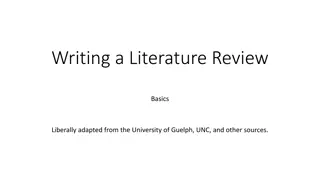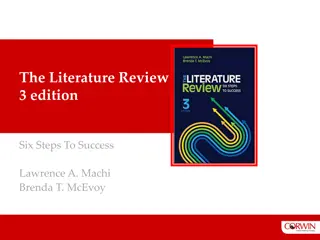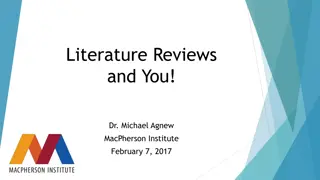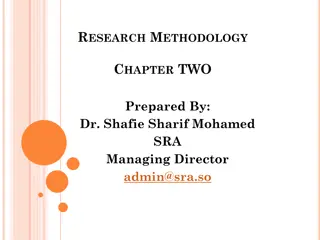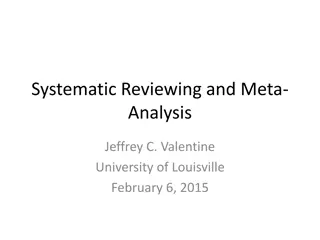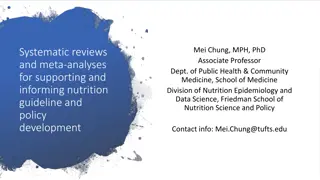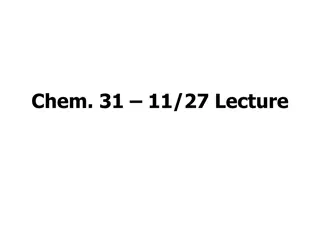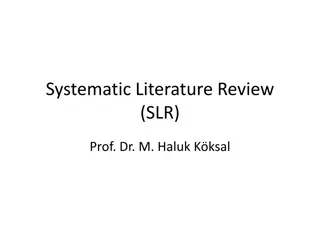Steps for Conducting Systematic Reviews
Systematic reviews are a crucial method for summarizing evidence effectively. This comprehensive guide by Irena Bond provides step-by-step instructions for beginners and junior researchers, including defining a research question, developing inclusion criteria, conducting a search, data extraction, q
4 views • 27 slides
Importance of literature review
A literature review is a critical component of any research endeavor, providing a comprehensive analysis of existing knowledge in a particular field. This review helps in clarifying conceptual issues, understanding research design, persuading examiners, and contributing new insights to the subject a
0 views • 28 slides
LITERATURE REVIEW
Reviewing literature is a crucial aspect of research projects, allowing for a theoretical foundation and connection to practical applications. Steps involved include sourcing, careful reading, note-taking, theme identification, drafting, and revising. Discussions with colleagues can enhance the unde
2 views • 13 slides
Mandated Reporting Policies for Perinatal Substance Use: A Systematic Review of the Literature
This systematic review explores mandated reporting policies in the U.S. concerning perinatal substance use. It highlights the impact of substance use on perinatal and infant health, the disparities in reporting practices, and the need for early interventions to protect vulnerable populations.
3 views • 14 slides
Mastering Literature Reviews: A Comprehensive Guide for Writing Success
A literature review is a critical discussion of relevant information on a specific topic, involving problem definition, interpretation, and identification of research gaps. It is not a mere collection of sources but a synthesis that guides further investigation. Incorporating APA style tips, this gu
1 views • 15 slides
New Policy for Systematic Processing of Long Term Care Admissions
This policy outlines significant changes in the processing of long-term care admissions through MEDI, aiming to streamline the submission process, improve efficiency, and reduce delays in reimbursement. Key updates include systematic editing upon submission, eligibility criteria for systematic proce
2 views • 34 slides
Understanding Systematic Reviews, Meta-analysis, and Clinical Practice Guidelines
Explore the importance of systematic reviews, critical appraisal questions, meta-analysis, and clinical practice guidelines in the healthcare field. Learn about the process of appraising systematic reviews, the significance of meta-analysis, and the benefits of following clinical practice guidelines
1 views • 16 slides
Effective Strategies for Literature Searches and Re-Use of Scholarly Literature
Conducting literature searches involves surveying existing publications and information on a specific topic. Different search strategies, from simple searches to systematic queries and snowballing, are utilized based on research needs. Learning objectives include building search strategies, using ad
3 views • 19 slides
Introduction to Isixhosa Language and Literature - Exploring Characters and Themes
This content provides an overview of Isixhosa as a first additional language (FAL) and delves into key aspects of literature such as character development and themes. It discusses the importance of characters in storytelling, emphasizing the significance of round and flat characters. The article als
3 views • 28 slides
Understanding Literature Reviews: Process, Purpose, and Types
A literature review is an essential part of academic research, providing a synthesis of existing studies on a topic. It involves reviewing published information within a specific subject area to help the reader understand the research background. The process of conducting a literature review is meti
0 views • 70 slides
Comprehensive Literature Review Guidelines for Your Dissertation
Discover expert guidelines for conducting a thorough literature review in your dissertation. Explore topics such as literature search strategies, theoretical frameworks, review of the literature, synthesis, and analysis, with actionable tips provided throughout.
0 views • 11 slides
Exploring the Significance of Persian Language and Literature in Indian History
Persian language and literature hold a crucial place in Indian history, serving as a prime source for understanding the medieval period. Scholars in India have dedicated their lives to preserving and promoting Persian history, language, and literature. The rich cultural heritage of India, dating bac
0 views • 9 slides
Ultimate Guide to Conducting a Literature Review: Step-by-Step Approach
Unlock the secrets of crafting a comprehensive literature review with this in-depth guide. From understanding the purpose to practical steps like searching for relevant literature and defining research problems, this resource covers it all.
2 views • 30 slides
Mastering the Literature Review Process
Understanding the significance of literature review, this guide emphasizes the essential steps involved in conducting a successful literature review - from planning and research problem identification to critical analysis and contribution to existing literature. It explains the importance of develop
0 views • 16 slides
Effective Strategies for Conducting Business Research Literature Review
This literature review provides insights into conducting business research effectively, covering topics such as how to search, read, and write literature reviews, along with the goals and types of literature. It emphasizes the importance of generating research ideas, demonstrating knowledge, and int
1 views • 13 slides
Tips and Tricks for Doing a Literature Review Successfully
Explore valuable insights and strategies shared by Khaled Hussainey, a Professor of Accounting & Financial Management, University of Portsmouth, UK. Gain knowledge on structuring literature reviews, identifying research gaps, developing hypotheses, and conducting systematic literature reviews. Disco
0 views • 66 slides
Understanding Grey Literature in Health Sciences
Grey literature refers to information not traditionally published, crucial for avoiding bias, checking new research, and accessing valuable sources like clinical trial records and government reports. Learn about its importance, characteristics, assessment methods, and where to find grey literature f
0 views • 12 slides
Mastering the Art of Literature Reviews
Understanding what a literature review entails, preparing for it effectively, choosing the right material, and finding relevant sources are key steps to conducting a successful literature review for academic research purposes.
0 views • 16 slides
Exploring Diagnoses in Literature and the Literature
This course delves into portrayals of medical conditions in literature versus research articles. It explores the intersection of science and literature, analyzing works like "Black Swan Green" and "The Reason I Jump" to understand how they depict conditions like stuttering and autism. Through studen
1 views • 28 slides
Evolving Perspectives on Literature and Translation
Explore the intertwined relationship between national literature, comparative literature, and world literature, delving into the evolution of translation studies. Reflect on the shift from national literary histories to world histories of literature, highlighting the significance of world literature
3 views • 54 slides
Managing Reporting Bias in Systematic Reviews - Strategies and Consequences
Reporting bias poses a significant threat to the accuracy of systematic reviews, with publication bias affecting up to 50% of trials. This bias distorts treatment effect estimates, leading to exaggerated outcomes. Strategies to mitigate reporting bias include searching bibliographical databases, exp
1 views • 17 slides
Exploring Job Creation Strategies: Insights from a Systematic Review
This presentation delves into the topic of job creation based on a systematic review conducted by Howard White of Campbell Collaboration. The review, led by Michael Grimm and Anna Luisa Paffhausen from the University of Passau, Germany, focuses on interventions for employment generation in micro, sm
0 views • 22 slides
Systematic Review of Marbled Murrelet Research in Oregon State Forests
A presentation to stakeholders in Salem, OR, on October 13, 2015, highlighted the systematic review conducted by the State Forests Division on Marbled Murrelet research. The review aimed to assess the science related to key elements of the PSG protocol and other hypotheses. The Division outlined the
0 views • 59 slides
Systematic Review Slide Set Overview
This systematic review slide set provides a structured approach to presenting key information such as the review process, PICOST framework, inclusion/exclusion criteria, risk of bias evaluations for RCTs and non-RCTs, and more. The content is concise, visually appealing, and tailored for a 15-minute
0 views • 10 slides
Understanding the Importance of Literature Review in Research
Exploring the roles of literature in research, this content emphasizes the significance of reviewing existing literature to gather ideas, compare methodologies, and integrate supportive information. It also highlights the types of reviews and essential questions to consider during the literature rev
0 views • 12 slides
The Status of Literature in Secondary Schools of the O.E.C.S. - Research Findings by Dr. Anthony Felicien
Research by Dr. Anthony Felicien examines the status of literature in secondary schools of the O.E.C.S., focusing on the decline of interest in literature among students, influenced by historical curriculum changes and parental attitudes. The study highlights the importance of studying literature fo
0 views • 35 slides
Authentic Assessment through Systematic Observation: Best Practices
Explore the process of authentic assessment through systematic observation in early childhood education. Learn about collecting, documenting, and interpreting assessment data using evidence-based practices and technology. Discover the importance of working collaboratively with families and professio
0 views • 53 slides
Mastering the Literature Review Process for Effective Research
Understanding the essence of literature reviews, this guide by Dr. Meri Wimberly delves into the significance of synthesis, identification of gaps in research, and informing research design. It navigates the phases of writing process, emphasizing preparation, composition, and finalizing with valuabl
0 views • 21 slides
Importance of Systematic Screening and Assessment in Pediatric Behavioral Health
This content discusses the significance of systematic screening and assessment tools in pediatric behavioral health. It highlights the rationale for using these tools to improve access, reduce bias, ensure comprehensive assessment, enhance validity, and efficiently triage patient needs. The case stu
0 views • 8 slides
Enhancing Governance through Systematic Disclosure and Transparency
Systematic disclosure and transparency play a crucial role in the governance and management systems of countries. This involves routine disclosure of information, such as financial data, to promote accountability and address gaps in information. The EITI Standard emphasizes the importance of mainstr
0 views • 23 slides
Mastering the Art of Writing Literature Reviews
Understanding the essence of a literature review, its descriptive and analytical components, selecting key articles, and finding relevant sources are essential steps in crafting a comprehensive literature review. By integrating ideas from various sources and highlighting crucial findings, a literatu
0 views • 18 slides
Comprehensive Guide to Literature Review Process
A literature review is essential before conducting research to identify existing information, gaps in literature, major works, and relationships between studies and theories. Follow steps such as defining the topic, sourcing information, discussing findings, and drafting to write an effective litera
0 views • 8 slides
Mastering the Art of Writing an Effective Literature Review
Understand the key differences between an academic paper and a literature review, explore the purposes of a literature review, and learn about the essential structure and steps involved in crafting a successful review.
0 views • 7 slides
Mastering the Literature Review Process: Essential Steps for Success
Understanding the essence of a literature review and its importance in academic research is crucial. This guidebook explores the key steps involved in conducting a literature review effectively, from defining the research topic to communicating and evaluating conclusions. It emphasizes critical thin
0 views • 13 slides
Mastering Literature Reviews: A Comprehensive Guide
Understanding the essence of literature reviews is crucial for academic success. A literature review situates your research within existing knowledge, defines key concepts, explains methodology, and identifies research gaps. It is not an annotated bibliography but a critical evaluation and synthesis
0 views • 17 slides
Effective Strategies for Conducting a Literature Review in Research Methodology
Understanding the importance of literature review in research methodology, this chapter discusses the objectives, aims, and guidelines for writing a comprehensive literature review. It emphasizes the significance of identifying gaps in existing knowledge, structuring the review, and organizing infor
0 views • 33 slides
Understanding Systematic Reviewing and Meta-Analysis
Explore the significance of systematic reviewing and meta-analysis in research literature, including definitions, options for conducting reviews, and reasons for the shift away from narrative reviewing. Discover the essential principles and future directions of systematic review practices.
0 views • 52 slides
Role of Systematic Reviews in Nutrition Guideline Development
Mei Chung, MPH, PhD, an Associate Professor in the field of Nutrition Epidemiology and Data Science, plays a significant role in conducting systematic reviews and meta-analyses to support and inform nutrition guideline and policy development. Her work involves identifying research gaps, informing po
0 views • 5 slides
Equilibrium and Acid-Base Problems in Chemistry Lecture
In this lecture, topics such as Advanced Equilibrium, Acid/Base Equilibria, Systematic Method for solving chemical problems, Strong Acid/Strong Base scenarios, and General Comments on reactions are discussed. Examples using the systematic method are provided for practical understanding. Key points o
0 views • 13 slides
Understanding Systematic Literature Review in Research
Systematic Literature Review (SLR) is essential in research to comprehensively collect and present findings on a specific topic. It is a structured approach that addresses quality issues and provides a consistent methodology for evaluating research studies. Contrasting with traditional reviews, SLRs
0 views • 45 slides
